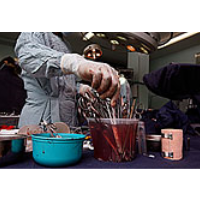Michigan Investigates 11 Years of Surgeries Sabotaged by Soiled Medical Instruments at Detroit Hospital
 (photo: Getty Images)
(photo: Getty Images)
By Andy Olesko, Courthouse News Service
DETROIT (CN) - The state of Michigan launched an investigation Thursday into the Detroit Medical Center after a bombshell newspaper report detailed years of patient neglect and complaints from doctors and nurses forced to use soiled or broken surgical instruments on those in their care.
The story by the investigative reporting team at The Detroit News was based on more than 200 pages of emails and memos obtained by the newspaper.
In some cases detailed in the reporting, serious surgical procedures were halted or delayed when dirty instruments were discovered in the center's operating rooms. The story, and accompanying pieces published online, paints a picture of a frustrated medical staff concerned about the problem.
"My team and I have been called broads, snipers, liars, sidekicks, a hit man, delirious, stupid and the enemy after issuing disciplines" wrote Lukeysih Hall in a whistle blowing email to the owner of the Detroit Medical Center, Tenet Healthcare.
Hall was hired to supervise the processing of sterile instruments.
"The problem with this department is that there are several personal relationships between people who support their wrong doing." Hall wrote.
In another email, Dr. Joseph Lelli, chief surgeon at Children's Hospital, described the working conditions to administrators.
"We are now operating on a child with the wrong instruments because he needs an urgent operation," he wrote.
One horrifying example of the problem detailed the heart surgery of a 7-month-old child. The procedure should take about three hours to complete. In this case, however, the early-morning operation extended into the afternoon after a suction tube used for blood was found to be clogged with that of a previous patient.
A subsequent report on the operation obtained by The Detroit News said the incident posed "significant risk" to the patient.
While the cleanliness of surgical instruments are an issue all hospitals reckon with, the regularity of problems at the Detroit Medical Center raised red flags among its doctors.
The News reported that some doctors gave up complaining because they were ignored and that a new management team in charge of sterilization has not lessened the problem.
According to the report, medical staffers found hair and dried blood on instruments, and were often forced to use malfunctioning equipment, like a cauterizing tool that burned a child's lip during use.
Another harrowing incident recounted by the newspaper had staffers scrambling to obtain tools to regulate a patient's heartbeat during his open heart surgery.
"THE PT IS ON THE TABLE HAVING OPEN HEART SURGERY AND WE CAN NOT PACE THE PT," Deborah Niedbala, the hospital's director of quality safety wrote in an email, stressing the seriousness of the incident by using all capital letters.
Joe Mullany, the medical center's CEO, responded to The Detroit News story with a written statement in which he said, "The DMC disagrees with many assertions made in the article." "Importantly ... there have been no safety issues and/or known Surgical Site Infection (SSI) related to our past CSP services," he wrote.
The memo also implored staff to assuage patient fears and "apologize for any concerns this article may have caused."
Mullany closed by stressing that patient safety is a "top priority" at the Detroit Medical Center.
To Learn More:
More Americans Estimated to Die from Hospital Mistakes than from Strokes and Accidents Combined (by Noel Brinkerhoff, AllGov)
Hospital Fined for Leaving Towel in Surgical Patient (by Ken Broder, AllGov California)
- Top Stories
- Unusual News
- Where is the Money Going?
- Controversies
- U.S. and the World
- Appointments and Resignations
- Latest News
- Trump Orders ICE and Border Patrol to Kill More Protestors
- Trump Renames National Football League National Trump League
- Trump to Stop Deportations If…
- Trump Denounces World Series
- What If China Invaded the United States?






Comments